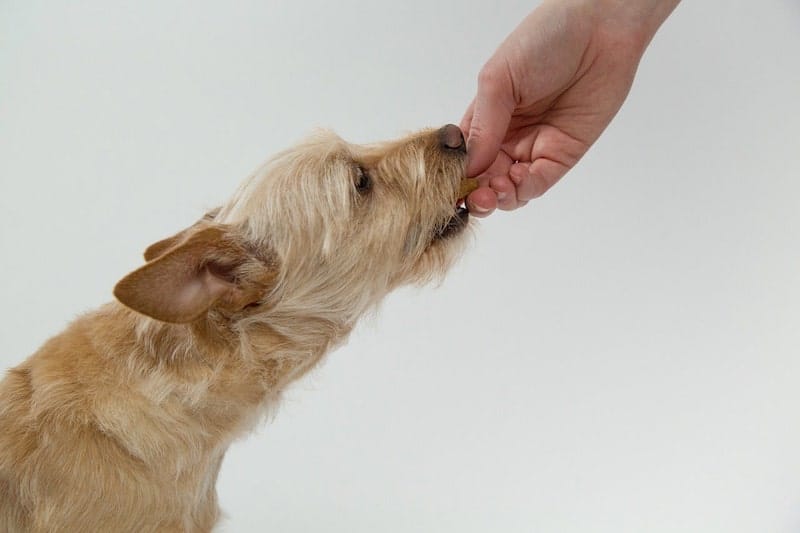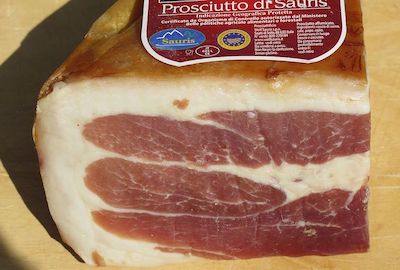Can Dogs Eat Prosciutto?
Prosciutto is a type of Italian ham that has been cured in salt and spices and hung to dry for several months. Prosciutto can be eaten raw or cooked. It’s often served as an appetizer with melon or figs before dinner. It can also be served with cheese and crackers or used in sandwiches.
However, not everyone can eat prosciutto because of food allergies or dietary restrictions. What about our furry friends? Can dogs eat prosciutto?
Prosciutto can be a great occasional treat for your dog, but it shouldn’t replace regular food. It contains too much sodium and can cause dehydration. It may also contain high amounts of preservatives that can be detrimental to your dog’s overall health.
In this article, I’ll discuss the nutritional content of prosciutto to see why it’s unfit for your dog. We’ll also explore what could happen to your dog if it eats prosciutto.
Can Dogs Eat Cured Meat, Like Prosciutto?
Cured meats have been around for centuries and are a popular food in many cultures. They are usually made from raw pork or beef and preserved with salt, nitrate, sugar, or honey.
Nitrates can give the meat an appealing red color and prevent it from spoiling quickly. In addition, the high levels of sodium help keep the meat moist during its long curing period, while sugar is also a preservative and adds flavor.
Cured meats were initially invented as a meat preservation method before the commercialization of refrigeration. However, their popularity is no secret.
From prosciutto, bacon, and salami to pepperoni – these are some of the most common foods that we find in our grocery stores and at restaurants.
It’s no secret that dogs love to eat. They may not be as curious as cats, but the sight of cured meat, like prosciutto, can be very tempting.
Nevertheless, cured meat can be dangerous for your dog, especially if it consumes too much of it. In addition, if your pup has any allergies or sensitivities to different meats, you may want to avoid cured meat treats altogether.
What Happens if My Dog Eats Prosciutto?
If your pup has a taste for prosciutto, you might be wondering what happens if you give in to its demands more often.
Of course, there’s a chance that the dog will just sleep off the effects of the high-fat meat. But there’s also a chance that it could get seriously sick. So, the odds are stacked against your dog coming out unscathed.
Let’s go over all possibilities in finer detail.
Dehydration
Cured meats, like prosciutto, can cause dehydration in dogs because they are high in salt. This can wreak havoc on your dog’s vital organs as they try to get rid of the excess salt from the body.
Salt poisoning comes with a wide range of systems. These include excessive thirst, vomiting, diarrhea, and frequent urination. Dogs that have a renal condition are particularly at risk of serious illness.
As soon as you notice any of these symptoms, it would be best if you took your dog to a vet immediately. Although allowing your dog to increase the water intake can help it to cope with the situation and speed up the recovery process, there’s a risk of bloating from drinking too much.
Gastrointestinal Upset
Cured meat can pack some serious spiciness. Prosciutto, for example, is often flavored with juniper, pepper, and garlic.
Although spices are generally not associated with severe health risks in cats or dogs on their own, they may cause gastrointestinal issues. These may include nausea, vomiting, abdominal pain, drooling, lethargy, and muscle loss.
That said, the threat level of prosciutto depends on the spices used. Some spicy flavors are worse than others.
For example, garlic contains a natural compound called allicin known to destroy red blood cells in dogs. On the other hand, Cayenne pepper contains a substance called capsaicin, which can affect areas of the mouth like the tongue, throat, and gums when ingested.
If you want to give your dog that occasional treat and surprise it with a few pieces of prosciutto, you should go for a variety that’s free of spices and flavors.
Stomach Upset
Prosciutto has a high-fat content, which can cause serious illness for your furry friend. This is primarily because a dog’s stomach doesn’t produce enough hydrochloric acid to digest large quantities of fat.
In the worst-case scenario, your dog can develop pancreatitis – inflammation of the pancreas. For example, if your dog ingests a large amount of fat, the pancreas will release unusually large amounts of enzymes into the small intestines to try and break down the fats.
If these substances escape from within the pancreas, they’ll irritate the surrounding tissues and cause severe stomach pain. Pancreatitis in dogs usually causes vomiting and other symptoms like lethargy, diarrhea, abdominal pain (tearing at their abdomen), and fever.
Bacterial Infection
There’s also the risk of your dog contracting deadly bacteria from prosciutto.
Salmonella and Escherichia coli are two of the most dangerous bacteria. If your dog ingests prosciutto that’s infected with such bacteria, it may develop life-threatening symptoms such as diarrhea and lymph node swelling under the forelimbs.
Trichinosis
Raw prosciutto can cause trichinosis, a parasitic disease found in humans, dogs, and other wild carnivores. The animal host becomes infected with the parasite when they eat raw meat or consume prey infested by tiny insect larvae called trichinella.
Symptoms of infection vary depending on age. Neonatal animals can experience severe neurological symptoms, but adult animals may only experience mild digestive symptoms. Older animals, on the other hand, can have gastrointestinal symptoms that are usually accompanied by fever.
The good news is that dogs typically experience total recovery after infection with trichinosis within 4-8 days. However, the best preventative measure you can take is to keep your dog away from raw meat diets like prosciutto.
FAQs
Is there a safe amount of prosciutto I can give to my dog?
While prosciutto should never replace regular dog food, it can be given as an occasional treat in small amounts. However, it’s essential to monitor your dog for any adverse reactions and ensure they have access to plenty of water to counteract the high salt content.
Are there any alternatives to prosciutto that are safer for dogs?
If you’re looking to treat your dog with meat, consider plain, cooked chicken or turkey without any added seasonings or spices. These are generally safer and more digestible for dogs compared to cured meats like prosciutto.
How can I tell if the prosciutto has harmful spices or flavors?
Always check the ingredients list on the packaging. Avoid prosciutto that contains harmful ingredients like garlic, cayenne pepper, or other strong spices. Opt for varieties that are free of added flavors and seasonings.
What should I do if my dog has eaten a large amount of prosciutto?
If your dog has consumed a significant amount of prosciutto, monitor them closely for signs of dehydration, gastrointestinal upset, or other symptoms mentioned in the article. If any of these symptoms appear or if you’re concerned about the amount they’ve eaten, consult your veterinarian immediately.
Can other cured meats, like salami or bacon, also be harmful to dogs?
Yes, similar to prosciutto, other cured meats like salami, bacon, and pepperoni can be high in salt and may contain harmful preservatives and spices. It’s best to avoid giving these to your dog or offer them only in moderation while monitoring for any adverse reactions.
In Summary
Can dogs eat prosciutto? The answer to this question is not entirely straightforward, but it’s been more or less established that prosciutto is unsafe for dogs except when consumed in moderation.
It should only be given as an occasional treat and never as a replacement for regular food. The risks are just too many.
If you’re going to feed your dog some prosciutto, first, make sure they get plenty of water. This will reduce the risk of dehydration and low blood pressure. Second, ensure that your dog doesn’t have any underlying health issues which can increase the risk of adverse reactions. Third, be sure to avoid spicy and flavored prosciutto varieties known to cause stomach upset.








